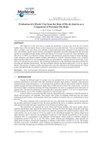Evaluation of the behavior of mortars produced with fibers from the straw of carnauba: effects of the content of addition and length used
IF 1.2
4区 材料科学
Q4 MATERIALS SCIENCE, MULTIDISCIPLINARY
引用次数: 1
Abstract
The rendering mortars must be able to absorb small deformations, in order to guarantee the stability of the masonry (performance and durability). When this premise is not met, there is a greater propensity for the appearance of cracks, one of the main and worrying pathological manifestations in mortar coverings. One of the alternatives to combat this pathological manifestation is the addition of natural/artificial fibers in order to improve the mechanical properties (mainly the traction strength) and, consequently, the deformation capacity of the mortar. In this perspective, this work analyzed the behavior in the fresh and hardened state of mortars with the addition of fibers obtained from the straw of the carnauba (Copernicia prunifera), an abundant tree in the region of the Acu valley/RN (Brazil). For this purpose, mortars were produced in a 1:3 mass ratio (binder:aggregate) with the addition of 3% and 5% fiber from the carnauba straw (CSF) in relation to the cement mass and with the water/cement ratio (w/c) fixed at 0.72 for all mixtures. The effects of using fibers with different lengths (20, 40 and 60 mm) were also investigated. The properties of mortars were evaluated in a fresh (consistency) and hardened (compression and flexural strengths) state. The results indicated that the addition of CSF results in mortar with less consistency and mechanical strength. However, in general, the best performance was obtained for additions of up to 3% and for longer fiber lengths (20 mm). Keywords: Vegetable fibers. Carnauba. Mortar with fibers.巴西棕榈秸秆纤维砂浆性能评价:添加剂含量和使用长度的影响
渲染砂浆必须能够吸收微小的变形,以保证砌体的稳定性(性能和耐久性)。当这个前提不满足时,出现裂缝的倾向更大,这是砂浆覆盖层的主要和令人担忧的病理表现之一。对抗这种病理表现的替代方法之一是添加天然/人造纤维,以改善砂浆的机械性能(主要是牵引强度),从而提高砂浆的变形能力。从这个角度来看,这项工作分析了砂浆在新鲜和硬化状态下的行为,添加了从巴西Acu山谷/RN(巴西)地区丰富的树木巴西棕榈(Copernicia prunifera)秸秆中获得的纤维。为此,砂浆以1:3的质量比(粘结剂:骨料)生产,其中巴西棕榈秸秆(CSF)纤维与水泥质量的比例分别为3%和5%,所有混合物的水灰比(w/c)固定为0.72。研究了不同长度纤维(20mm、40mm和60mm)的使用效果。砂浆的性能在新鲜(稠度)和硬化(压缩和弯曲强度)状态下进行评估。结果表明,CSF的加入降低了砂浆的稠度和机械强度。然而,一般来说,当添加量达到3%和纤维长度较长(20mm)时,性能最好。关键词:植物纤维;巴西棕榈。纤维砂浆。
本文章由计算机程序翻译,如有差异,请以英文原文为准。
求助全文
约1分钟内获得全文
求助全文
来源期刊

Materia-rio De Janeiro
MATERIALS SCIENCE, MULTIDISCIPLINARY-
CiteScore
1.00
自引率
25.00%
发文量
51
审稿时长
6 weeks
期刊介绍:
All the articles are submitted to a careful peer-reviewing evaluation process by the journal''s Editorial Board. The Editorial Board, reviewers and authors make use of a web based proprietary automated tool to deal with the reviewing procedures.the Revista Matéria''s article reviewing restricted access system - SEER. Authors are not informed about the identity of the reviewers.
 求助内容:
求助内容: 应助结果提醒方式:
应助结果提醒方式:


